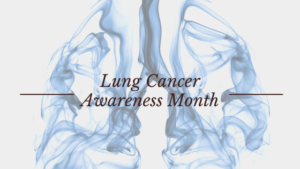Did you know that November is Lung Cancer Awareness Month? Dedicating a month to lung cancer gives people the opportunity to educate the public, raise awareness, and allow others to share their stories with lung cancer. Learning about lung cancer can help the public understand the potential causes and risk factors of the disease. In addition, it also promotes the need for screening among the eligible populations.
What is Lung Cancer?
You might wonder, what really is lung cancer? Lung cancer is a disease where the cells in the body grow out of control. It’s called lung cancer when the cancer originates in the lungs. Since lung cancer starts in the lungs, that doesn’t mean that it will stay there. They can spread to lymph nodes along with other organs in the body. In unfortunate cases, the cancer can spread to other organs such as the brain. When this happens, it’s called metastases.
The CDC states, “Lung cancers usually are grouped into two main types called small cell and non-small cell (including adenocarcinoma and squamous cell carcinoma)”. Each of these types of lung cancer grow differently and are treated differently. Non-small cell lung cancer is more common than small cell lung cancer.
Lung Cancer Facts
Here are some facts about lung cancer from Healthline
Lung cancer is the most common type of cancer throughout the world
In 2015, there were almost 1.7 million deaths worldwide from lung cancer.
In the United States, lung cancer is the second-most common Trusted Source type of cancer
Prostate cancer is more common for men, while breast cancer is more common for women. In 2017, there were an estimated 222,500 newly diagnosed cases of lung cancer in the United States.
Early lung cancer might not cause any symptoms
This means that lung cancer is often only caught in later stages. A chronic cough is the most common symptom of early lung cancer. This cough will probably get worse over time.
Smoking is the leading cause of lung cancer
Approximately 80 percent of lung cancer deaths result from smoking. If you’re between 55 and 80 years old, smoked for at least 30 years, and either smoke now or quit less than 15 years ago, the U.S. Preventive Services Task Force recommends that you get yearly screenings for lung cancer.
Even if you don’t smoke, being exposed to secondhand smoke can raise your risk of lung cancer
Secondhand smoke causes around 7,000 lung cancer deaths per year. Quitting smoking reduces your risk of lung cancer, even if you’ve smoked for a long time.
The second leading cause of lung cancer is radon
Breathing it in exposes your lungs to small amounts of radiation. Radon can build up in your home, so radon testing is important.
Lung Cancer Myths
In addition to facts about lung cancer, Healthline also talks about the myths.
You can’t get lung cancer if you don’t smoke
Although smoking causes most cases of lung cancer, it does not cause all of them. You can develop lung cancer from exposure to certain “air pollutants” along with secondhand smoke. Some examples of these are exposure to radon, asbestos, hazardous chemicals, and air pollution. A family history of lung cancer can also increase your risk. There are some rare cases of lung cancer that aren’t linked to any risk factors.
Once you’re a smoker, you can’t lower your risk of lung cancer
Most people feel like they’ve been smoking for so long that they are bound to develop lung cancer even if they stopped smoking. In reality, even if you’ve smoked your whole life, quitting can drastically decrease your risk for developing lung cancer. If you’ve been diagnosed with lung cancer, quitting can help your body respond better to treatment.
Lung cancer is always deadly
Unlike other cancers, lung cancer is often diagnosed in the later stages. It’s found once the cancer has already spread where most are given a five-year survival rate. If lung cancer is found in the early stages it can be curable. If it’s not curable at that stage, treatment can help to lessen your symptoms along with extending your life.
Only older adults get lung cancer
Although lung cancer is much more common in people over 60 years old, doesn’t mean that people under 60 can’t develop it.
After being diagnosed with lung cancer, there’s many takeaways. You learn that there are many ways to prevent lung cancer as well as increase your mental and physical health. If you’re worried about lung cancer or feel as if you could develop it, reach out to your doctor. Your doctor will work with you to find the best course of treatment. Put together a list of questions before you have a meeting with your doctor. This way, you’ll make sure that you get all your questions answered and you won’t forget about any that you had. If you’re a heavy smoker or have any other high risk factors to develop lung cancer, schedule an appointment with your doctor to set up health screenings. In addition to screenings, you can also talk about other preventative measures which can include a plan to quit smoking. If you know someone that has lung cancer, make sure to comfort them during this time. Being diagnosed with any type of cancer can be heartbreaking. Knowing that that they have people around them that care can make the world of a difference. Be there for someone as they would be there for you.
Best,
Danielle Morrow
Marketing Specialist


